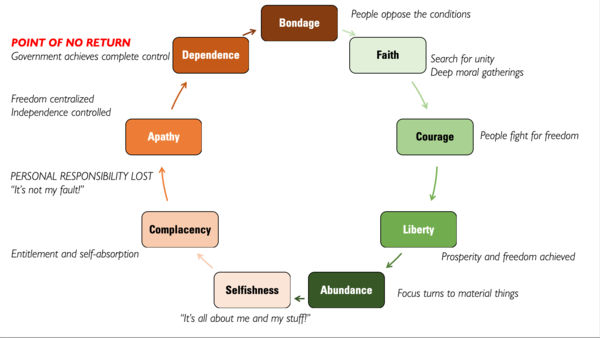History, or more accurately, HIStory, has always seemed to occur in cycles. Ascendancy and decline. Collapse and rebirth. Spring and fall. Over and over again. And with smaller cycles occurring as part of larger ones as well. The modern meme about it goes like this:
Hard times create strong men.
Strong men create good times.
Good times create weak men.
Weak men create hard times.
And so on. And if current events are any indication, we seem to be in the "weak men create hard times" stage, alas. But the authors of this meme did not pull this out of the ether, rather, this idea of the cyclical nature of history is thousands of years old. The ancient Greeks called it "Anacyclosis".
Per Wikipedia:
Anacyclosis states that three basic forms of "benign" government (monarchy, aristocracy, and democracy) are inherently weak and unstable, tending to degenerate rapidly into the three basic forms of "malignant" government (tyranny, oligarchy, and ochlocracy). [Ochlocracy = mob rule]
Polybius' sequence of anacyclosis proceeds in the following order: 1. monarchy, 2. kingship, 3. tyranny, 4. aristocracy, 5. oligarchy, 6. democracy, and 7. ochlocracy. [And finally chaos, and then the cycle repeats with a new king emerging from the chaos...]
And then there is the "Tytler Cycle" (or "Fatal Sequence") as well. The following quote, actually of somewhat unknown authorship, has nonetheless been attributed to Alexander Fraser Tytler sometime in either the late 18th or early 19th century, though occasionally it has been attributed to Alexis de Toqueville as well:
- A democracy is always temporary in nature; it simply cannot exist as a permanent form of government. A democracy will continue to exist up until the time that voters discover that they can vote themselves generous gifts from the public treasury. From that moment on, the majority always votes for the candidates who promise the most benefits from the public treasury, with the result that every democracy will finally collapse due to loose fiscal policy, which is always followed by a dictatorship.
- The average age of the world's greatest civilizations from the beginning of history has been about 200 years. During those 200 years, these nations always progressed through the following sequence: From bondage to spiritual faith; From spiritual faith to great courage; From courage to liberty; From liberty to abundance; From abundance to selfishness; From selfishness to complacency; From complacency to apathy; From apathy to dependence; From dependence back into bondage.
These two paragraphs actually did not occur together until the 1970s, but the latter one is the one that stuck the most. It can thus be summarized graphically as follows:
The first paragraph of course can be debunked by the theories of Monetary Sovereignty and Modern Monetary Theory, in that a government that issues and controls it's own sovereign currency cannot really go bankrupt unless they deliberately choose to, and thus loose fiscal policy per se need not result in a dictatorship. In Venezuela, for example, dictatorship (and corruption) actually came first, well before their extremely loose fiscal policy. Furthermore, Switzerland is the very closest thing to a truly direct democracy in the modern world, and interestingly the voters in 2016 actually rejected a Universal Basic Income (UBI) referendum. And even Canada, arguably somewhat more democratic in practice than the USA (prior to 2020), had actually shrank the size of its government dramatically from 1990 to 2019 via fiscal austerity (which came at a heavy price), and barely any stimulus even during the Great Recession. But the second paragraph is the one that is the real essence of the quote, regardless of what sort of governing system is in place. And it seems to be true throughout history time and again.
To be fair, many civilizations have lasted for much more than 200 years, and sometimes some of the stages listed here are truncated, inverted, and/or leapfrogged over entirely. But as a general rule or heuristic, it largely holds true.
And more recently, William Strauss and Neil Howe's generational theory also appears to dovetail with all of this. And the ever-insightful Julius Ruechel observes how that cycle seems to occur every four generations, or roughly 80 years or so (making us due for a major crisis by 2020, being about 80 years since the Great Depression and its infamous segway into WWII). This is, of course, a smaller cycle within larger ones like the ones mentioned above, but again it follows basically the same pattern. A pattern that seems to be, for all intents and purposes, sooner or later, inevitable and written in stone. So what is the underlying reason?
Thus once again, we return to the first meme, with the proper emphasis added this time:
Hard times create strong men.
Strong men create good times.
Good times create weak men.
Weak men create hard times.
And so on. Now do you see why? Because MEN are in charge, that's why. Strong men and weak men are ultimately two sides of the same coin. And thus only Women can finally break the cycle for good, by reclaiming their rightful place as the new leaders of the free world, Goddess willing. And as they say, the rest will be HERstory.
Let the planetary healing begin!



No comments:
Post a Comment